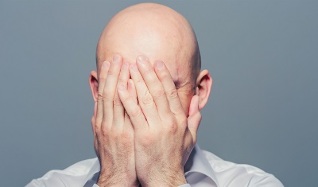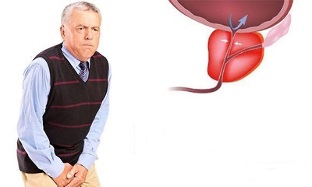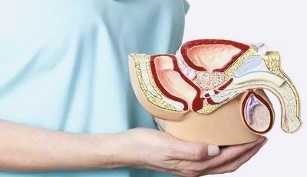
This dangerous disease is one of the most common diseases in the human half. Many close their eyes to the malaise that arises and awaits the development of all kinds of unavoidable consequences that make normal life impossible. We will tell you about the symptoms of prostatitis in men and their treatment.
Prostatitis is an inflammation of the prostate gland, which, according to statistics, affects a large number of men of all ages. At the age of thirty, one in three suffers from this disease, over the years the number of patients increases steadily, and almost everyone in their sixties is faced with one form or another. And this is just official data, but in fact the rate of its occurrence is much higher, but due to the reluctance of men to go to the doctor, doctors can not give accurate figures.
From an early age, boys are taught that real men should be persistent, withstand pain and not pay attention to illness. And there is no problem to run to the doctor with a little discomfort. This rule is strictly adhered to by the majority of adult men who discuss their problems to the doctor as a last resort, and sometimes even in an ambulance or in a hospital.
Unfortunately, this also applies to prostatitis. The first "bells" of concern such as frequent need to go to the toilet, sometimes pain and discomfort when urinating, some problems with libido and potential, are explained by anything: hard work days, scandals with bosses, parties toostorm the day before.
And the main thing - nothing to think about, everything will pass by itself. There is some logic in this: the first signs of prostatitis in men are less noticeable, causing the patient to experience some difficulty and immediately disappear. Only one thing is not taken into account: the painful symptoms have passed, but the disease itself is not gone. It only turns into a chronic form, which does not manifest itself for a long time, and then, under the influence of negative factors, it becomes worse and causes more suffering.
Although it seems that the health problems that arise do not need to be solved and will disappear immediately without any treatment, know that they can be attackers of serious illness. Be sure to see a doctor, undergo the necessary check-ups and examinations. Remember that any disease is easier and quicker to cure if you do it right away.
Causes of disease
Prostatitis can be caused by a variety of factors, often unrelated to the reproductive system. This is one of the most dangerous diseases.
Let's list the causes that cause inflammation of the glands most often:
- Pathogenic microorganisms are one of the leading causes of this disease. Initially, a person can get sick with any infectious disease: from infectious urinary tract inflammation, venereal disease, and ending with tonsillitis, sinusitis, bronchitis or hemorrhoids, which is not expected in this case. Even untreated dental caries can cause prostate problems in the future. From the farthest part of the body from the prostate gland, pathogens enter it with blood, lymph, and other biological fluids. This must be added to the weakened immune system in almost everyone, because with normal immunity, the flu is unlikely to cause inflammation of any of the organs of the reproductive system.
- Circulatory disorders in the small pelvis - this reason properly ranks second on the list. Blood stagnation, disruption of normal blood supply, and, consequently, organ hypoxia occur due to physical inactivity, constant sitting at work and at home. This leads to a significant increase in prostate size. Similar changes were observed in overweight people.
- Frequent tremors and tension of the perineum muscles - people from some professions, for example, drivers, are prone to this.
- Hormonal imbalance - occurs in many diseases and has a very negative effect on prostate health.
- Hypothermia.
- Frequent constipation.
To reduce the likelihood of illness, you need to monitor the regularity of your sex life. Do not forget that both prolonged abstinence and too frequent intimate relationships have negative effects.
What form of disease is isolated

- Bacterial prostatitis- caused by pathogenic bacteria. It can be acute (more common in young people) and chronic. Recent studies show that, in general, infections affect pathologically altered glandular tissue, with severe circulatory disorders.
- Prostatitis is not bacterial or abacterial- although laboratory examination does not show the presence of pathogenic microorganisms in diseased organs, their participation in the process can not be completely ruled out.
- Prostatodynia- all symptoms of prostatitis are present, but inflammation of the glands is not detected.
How prostatitis manifests itself
To detect the disease in time, you need to know what are the symptoms of prostatitis in men. The most notable feature is the acute form of the disease.
- Weaknesses and general abnormalities.
- Shivering and fever.
- Increased body temperature.
- Headache.
- Severe pain in the perineum and groin area, which gets worse when urinating and defecating.
- The need to go to the toilet often, and immediately after urinating the patient feels the urge again, because the bladder has not been completely emptied.
- Severe conditions requiring immediate medical attention are expressed in acute urinary retention.
- Nervous tension, irritability.
Symptoms of chronic prostatitis
In the chronic form, the disease can be asymptomatic for many years, and the symptoms can be easily confused with the manifestations of other diseases.
Let's think about how this disease manifests itself:
- Pulls pain in pelvis and lower back- the pain comes from the perineum, which is felt in the lower abdomen, urethra, testicles. In addition, patients experience lower back pain radiating to the legs, which is often mistaken for sciatica or other neuralgia. The pain may be concentrated in one place, or it may be painful together.
- Difficulty and frequent urination- pain usually occurs when the patient starts or stops urinating. At the same time, it is impossible to hold back and hold back the urine: even though the man has recently gone to the toilet, the sensation seems to be full of capacity. During urination in a weak flow, very little urine is expelled.
- Decreased sexual activity- prolonged inflammatory processes, circulatory disorders, pathological changes in prostate tissue can not be wasted and ultimately lead to a decrease in libido and significant potency. This is because nerves pass through the glands, which emit impulses to the brain centers responsible for erections. One of the consequences of this disease is damage to these nerves, a decrease in their sensitivity and the development of disorders in the intimate space. At first, the erection does not lose its strength, but at the same time, early ejaculation is observed, then the erection itself becomes weaker, and orgasm becomes slower. Testosterone synthesis is gradually inhibited and sexual desire is catastrophically reduced. In some cases, during ejaculation, a man feels a sharp pain in the head of the penis.
- Scars of prostate tissue and reduction of organ size.In further cases, this process spreads to the urinary tract and bladder, causing severe urinary incontinence. All this leads to the development of renal dysfunction, the development of urolithiasis and other serious conditions.

Treatment of various forms of disease
We have seen the most common symptoms of prostate inflammation in men, now let's find a way to treat this disease.

Although there are many studies devoted to the treatment of prostatitis, to date, the general therapeutic scheme is unknown. Treatment may be different in each particular case, but there is no doubt that it is very important to correctly determine the cause of the disease and begin therapy at an early stage of pathological development.
In acute prostatitis of bacterial genesis, patients must be hospitalized, given antibiotic therapy, prescribed anti-inflammatory drugs, analgesics, drugs that normalize blood circulation.
The chronic form of the disease is very difficult to treat, and is usually incurable. In the case of successful treatment, a long period of remission is achieved, in which signs of prostatitis in men and their symptoms do not appear.
Complex therapeutic procedures are selected individually for each patient. Patients are given non-steroidal anti-inflammatory drugs, drugs that increase blood circulation in the prostate, immunomodulatory drugs, vitamins. Also, a man should undergo a course of physiotherapy, prostate massage, and do regular physical exercises aimed at maintaining the health of the prostate gland.
























